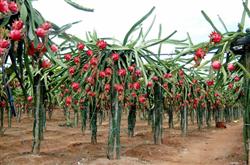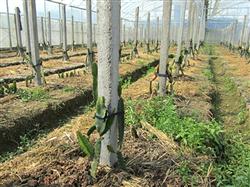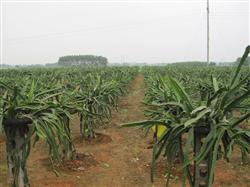Can I apply foliar fertilizer to grow dragon fruit?

Can I apply foliar fertilizer to grow dragon fruit? Please give me a detailed introduction.
Pitaya can be applied foliar fertilizer, the first thing to understand the pitaya plant surface characteristics. It is native to the arid zone of South America and belongs to the perennial vine of Cactaceae. It has the physiological and ecological characteristics of drought-adapted plants. As shown in the picture on the right, its stems and leaves have mutated, showing triangular column-shaped succulent green branches, while the leaves have degenerated into needling spots, distributed on triangular prisms. There are a large number of brown aerial roots on the branch surface, which constitute all the vegetative organs for dragon fruit to receive foliar fertilizer. Foliar fertilizer is sprayed on the surface of triangular column branches. In order to improve fertilizer efficiency, the dragon fruit foliar fertilizer must be sprayed around the triangular column, sprayed on all three sides. The requirements of the branch surface characteristics of dragon fruit on the composition of foliar fertilizer are as follows: the efficiency of foliar fertilizer and leaf surface properties are closely related to the structure, and the cuticle of epidermis is a barrier for mineral nutrients to enter the body. the thick waxy leaves on the leaf surface, the fertilizer droplets are not easy to infiltrate into the leaves, and the droplets of liquid fertilizer will slide down from the surface after spraying, resulting in nutrient loss without absorption and fertilizer effect. There is a thick hard and hydrophobic wax layer on the surface of the triangular column of dragon fruit, which puts forward special requirements for the preparation and application of foliar fertilizer. In order to ensure the effect, excellent auxiliaries must be added to the preparation of foliar fertilizer. Auxiliaries are auxiliary components of foliar fertilizer, which refers to additives other than nutrient elements in foliar fertilizer. The auxiliary system of foliar fertilizer is complex and important, which plays a decisive role in maintaining the excellent physical and chemical properties of foliar fertilizer and ensuring product quality. The main components of auxiliaries are surfactant, which has a series of functions, such as infiltration, infiltration, emulsification, dispersion, solubilization, moisturizing and so on. Generally, the surface tension of fertilizer solution can be significantly reduced by adding a small amount of surfactant, and auxiliaries are especially important for the fertilizer effect of special foliar fertilizer for dragon fruit. Because the hydrophobic wax layer on the surface of dragon fruit triangular column branches is strong, the general water-soluble foliar fertilizer is not easy to infiltrate and penetrate, which will directly affect the effect of nutrient absorption. Only by adding excellent auxiliaries can the foliar fertilizer stick and spread on the surface of the triangular column, prolong the wetting time and achieve the purpose of nutrient absorption. Although there are many kinds of surfactants in the market, experimental studies at home and abroad show that the effect of auxiliaries such as organic fertilizer and betaine is better. These are also suitable for special foliar fertilizer of dragon fruit. Secondly, the selection of nutrient composition of foliar fertilizer should be based on the supplement of medium and micronutrient elements and the principle of combining with a large number of nutrient elements. in the long production period from April to November every year, magnesium, boron and nitrogen were mainly supplied in the early stage. as a result, more attention should be paid to the successive supplements of potassium, nitrogen, magnesium, calcium, iron and boron in the middle and later stages. They are beneficial to improve the stress resistance and quality of dragon fruit. In addition, in order to improve the pertinence of foliar fertilization, it is also necessary to refer to the limited nutrient types of the soil, it is best not to choose Shiquan fluid replacement, which is both expensive and untargeted, and the effect is not necessarily good. We should also pay attention to the requirements of the characteristics of photosynthetic metabolism of dragon fruit on the application technology of foliar fertilizer. The dragon fruit, which is originally produced in arid areas with succulent characteristics, belongs to the type of sedum acid metabolism. Their stomata are open at night and closed during the day, which is contrary to that of other C4 plants. As the main way for foliar fertilizer to enter the plant is through stomata and cracks in epidermis, the best time for foliar fertilizer spraying is after 5: 00 p.m. and 6: 00 p.m., and spraying fertilizer at sunset is beneficial to nutrient absorption. In addition, the nutrient concentration of foliar fertilizer can be appropriately increased by 10% to 20% according to the characteristics of dragon fruit, and the effect is better. In short, foliar fertilizer spraying effect is faster than root fertilization, can directly and quickly reach the dragon fruit nutrients, to avoid the fixation of fertilizer nutrients in the soil. But the disadvantage is that the amount of fertilizer application is limited and the effect is relatively short. Therefore, foliar fertilization is an auxiliary way of dragon fruit fertilization. It might as well be used in coordination with root fertilization to increase yield. Click to get more dragon fruit planting techniques click to get more fruit planting techniques
- Prev

How to plant dragon fruit?
How to plant dragon fruit? Please introduce planting methods and management methods for dragon fruit cultivation can refer to the following methods: first, biological characteristics dragon fruit belongs to tropical and subtropical fruit, drought resistance, high temperature resistance, like light, soil quality requirements are not strict, flat land, hillside, sandy land can be planted, the most suitable soil p.
- Next

How to manage dragon fruit after planting?
How to manage dragon fruit after planting? Please introduce the management method that begins to blossom and bear fruit about 12 Mel 14 months after planting. It can blossom 15 times a year. April to November is the fruiting period. The fruit can be harvested 40 days after Xie Hua. The weight of a single fruit is generally 500 Mel 1000 grams. There are more than 20 fruits per column in the second year after planting.
Related
- Moge, come on! The staff of the peasant association in the producing area of cantaloupe were frightened when the crowd gathered.
- Causes and Solutions of low Fruit setting rate of Apple
- Symptoms and control measures of passion fruit virus disease
- Fruit growing lesson: how do apple orchards keep high yields?
- Can you build orchards in the mountains? What are the pros and cons?
- How to manage the coloring period of Crisson grape?
- This paper introduces the processing technology of two kinds of fig products.
- How much is a month for retired teachers in rural areas by 2020?
- How can strawberry planting increase sugar content? We should pay attention to management in many aspects.
- What are the cultivation techniques on how to improve the yield of golden fruit?

